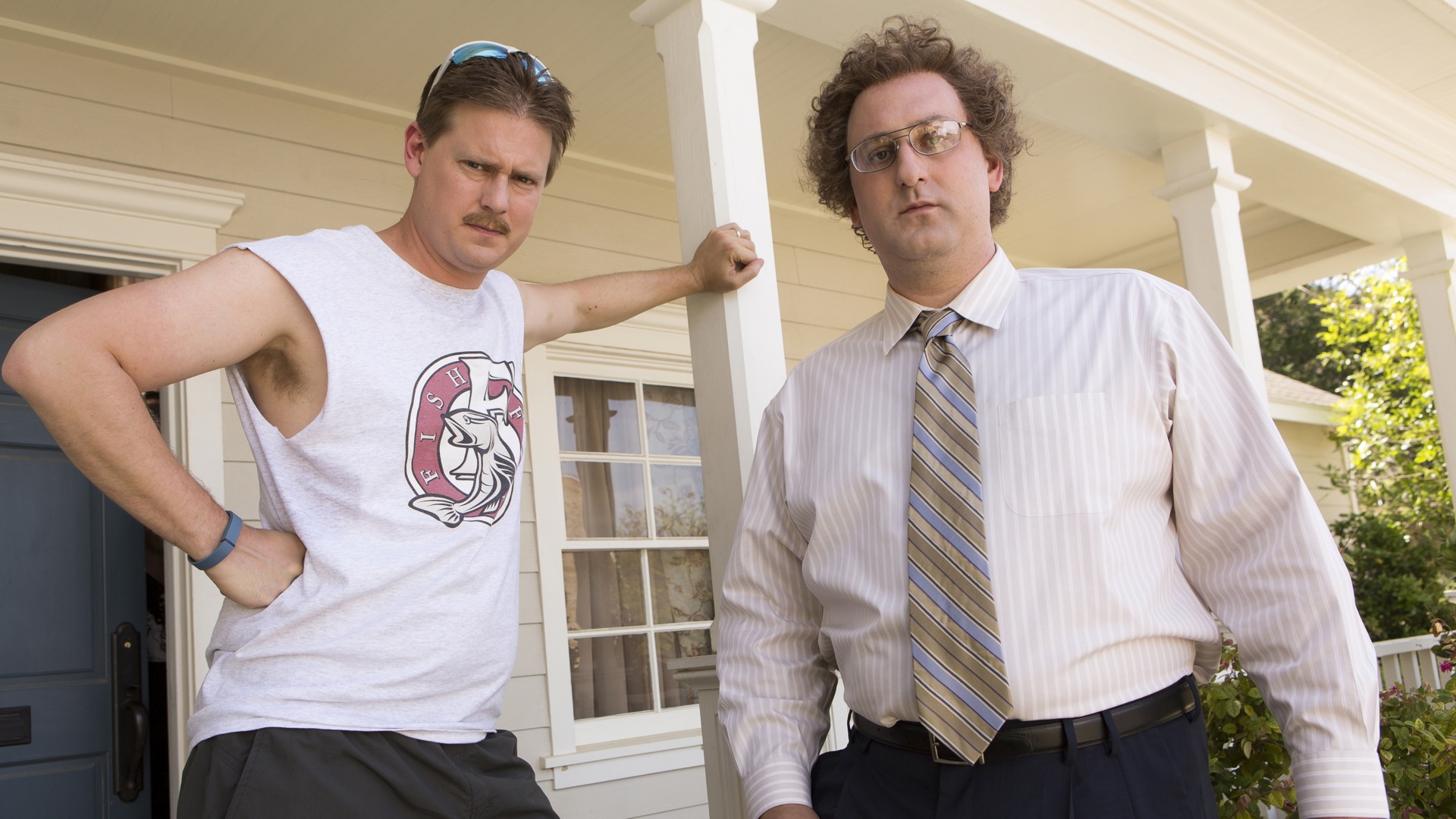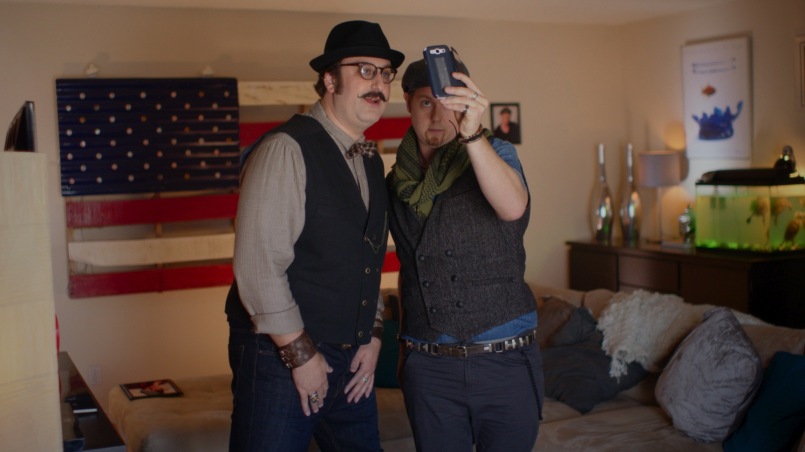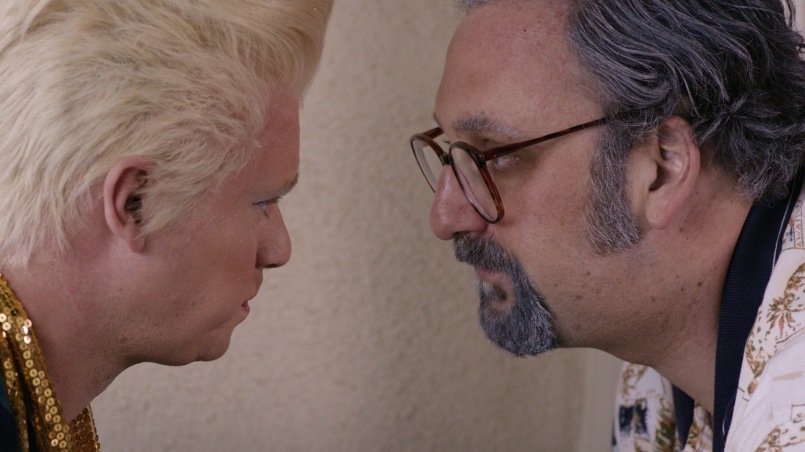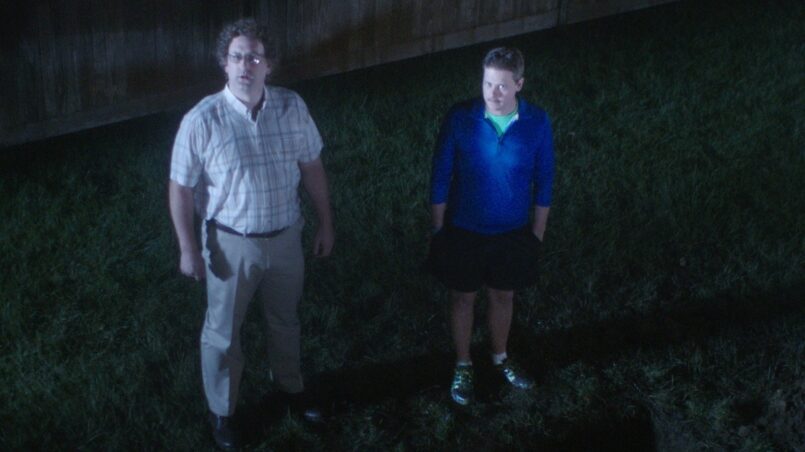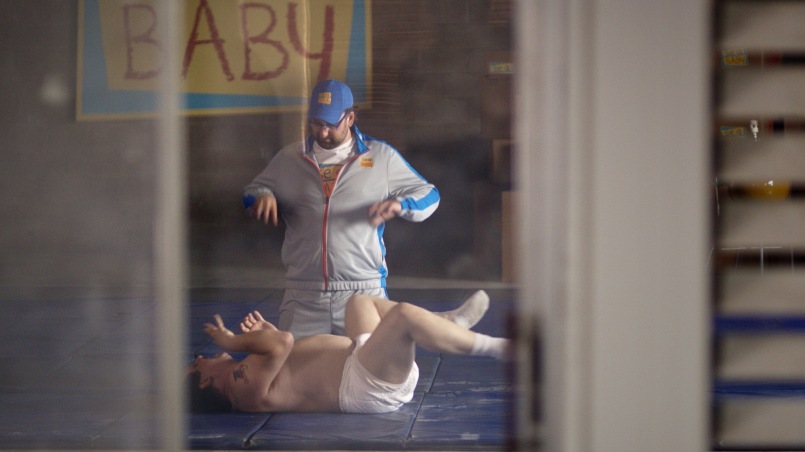Over the last ten years, Tim and Eric have worked steadily to build a wholly unique comedy empire. From their late-night Adult Swim sicko sketch pastiche of Tim and Eric Awesome Show, Great Job! to projects like Tom Goes to the Mayor and Tim and Eric’s Billion Dollar Movie to John C. Reilly’s sad-sack oddball saga Check It Out! with Dr. Steve Brule, the Los Angeles-based duo of Tim Heidecker and Eric Wareheim have cornered their own market, creating a trailblazing and recognizable brand featuring choppy basic-cable editing, gross-out jokes, megastar guest spots, and quirky humor for the Internet era.
The pair have also ventured out from under their Adult Swim umbrella to direct music videos (Wareheim’s epics for Major Lazer, MGMT, Beach House), act in other people’s films (Heidecker’s starring role in The Comedy), and play in bands of their own. Don’t let the sophomoric gags fool you; underneath their ventriloquist-dummy-in-drag veneer is an intense dedication and unbridled comedic brilliance on par with anything being created today, in any arena.
Fresh off a six-week national tour with Reilly, the duo have branched out yet again to create Tim and Eric’s Bedtime Stories, a narrative-driven change of pace for Adult Swim featuring eleven-minute episodes of coherent plots, characters, and—perhaps a Tim and Eric first—structure. From makeup chairs at a Hollywood photo studio, Heidecker and Wareheim spoke candidly about revelations brought from touring, how Bedtime Stories has allowed them to explore new creative avenues, a forthcoming book project, and which character actors from cinema past are in fact still alive and eager to work.
But first, enjoy this exclusive clip from Thursday night’s Bedtime Stories season finale, “Baby.”
I guess it’s worth mentioning that I’ve never really had much luck getting comedians to talk about their craft. What makes something funny? Who knows?
Tim: Well, there’s something very traditional about the way we do stuff—especially at this show. Maybe with Awesome Show it’s a little more nutty, but [with Bedtime Stories] we sit in a room and come up with ideas, or bring ideas and flesh them out, and write the script, cast it, shoot it, and edit it… You have to find that balance between knowing what works, knowing what feels new and fresh, and not resting on your laurels too much.
Eric: But also not thinking about it too much. We don’t think about how our audience is gonna react. The number one priority for Tim and me is, “What’s gonna turn us on or keep us interested?”—what we think is funny. And then we need to put it in a short film or sketch or movie or book or band. That’s sort of how we do it.
John Reilly told me the story of his first time working with you guys and just how blown away he was by the complete sense of freedom that you had been given by your bosses.
Tim: Yeah, we’ve been lucky from the beginning as Adult Swim is conveniently 3,000 miles away. So, physically, it’s not easy for them to check in on us. But also [Adult Swim honcho] Mike Lazzo really believes in the creator; he believes that he doesn’t know any better than anybody else, so he doesn’t have an ego and stays out of it. And it’s either going to succeed or not, but it’s not based on anybody’s notes, really. He lets us fail; he lets us succeed.
Is it gratifying to then be on a tour and have real humans to interact with who provide you with feedback beyond just YouTube comments?
Eric: Yeah, we didn’t tour for four years, so we kind of were like, “Are there Tim and Eric fans?” Until we started selling out shows and were like, “OK, they’re still alive and even more feverish.” But we also used to play in bands, and a show while we grew up was thirty people, like, “Yes, this is a victory.” And now I still get that feeling coming out to a thousand people and it’s awesome.
Tim: I would go out [of a venue] after people had whittled away and there’d still be hardcore people there, and everybody’s super nice and friendly. There’s a certain stereotypical Tim and Eric fan, a comic-book nerd kind of sweaty guy with a big beard… But there’s all walks of people, you’d be so surprised. Like, a lot of normal girls. Normal girls were like, “Oh my god, I fucking love you guys.”
Was this tour the first time you recognized that?
Tim: I noticed that it was a consistent thing, that there was a normal quality to the audience where what we do is just considered “comedy.” Not just this cult-y, very specific, uber-fan kind of thing like, “Oh, I like that show, and I like comedy, and I’m gonna see these guys.” So we’ve become a little more broad or mainstream. We haven’t changed, but I think the sensibilities have changed a little bit.
Eric: But the most fun is still, “How do we make each other laugh?” By the end of the tour that’s what it’s all about. It’s Tim adding little things, or us trying to crack Dr. Brule up…
How often do you find that what makes either of you laugh doesn’t make the audience laugh one bit?
Tim: Most of the time. You know, because at that level it’s an inside joke or something. But we’re pretty good at conceiving ideas that are gonna get a whole room to laugh.
But not lowest common denominator jokes?
Tim: Sometimes, yes. Sometimes you put a picture of a penis up—or a tiny penis up—you’re gonna get a lot of people laughing. [Laughs.]
The smaller the penis, the bigger the laugh?
Eric: Yeah. There’s a mathematical equation for that. We get those.
Reilly said very honestly that he thinks Dr. Brule is the best thing he’s ever done. Period.
Tim: What’s been great about that character is where it’s gone. We look back on the early Brule that everybody got onboard with and don’t even recognize it. But because John’s such a great actor and up for going to these dark places, it’s a great character to explore and there’s so many areas that we can continue to go to. You start feeling for the character; he’s a very sympathetic, sad character that’s fun to play with.
The not-hip doofus is gone; he’s become a sad human.
Tim: Yeah, it’s a real fucked-up situation. And the people around him are fucked up. So Brule’s become much more than just [Reilly] on a green screen. It’s a real universe that we’re proud of.
Was that a conversation you had or did it organically map itself out over the seasons?
Tim: It’s so organic. It’s just—again—what makes us laugh and what turns us on.
Eric: Whenever we have a popular character, we either kill them off or purge them so heavily that their life gets that much worse.
How much do you arc characters or stories out on paper?
Tim: Not super far. We just try to make sure—and John’s very adamant about this, too—that to stay true to the character is not destroying anything that’s consistent. But looking back on everything, you could say, “OK, this all made sense and there’s reason that you guys did it this way.” With Bedtime Stories we obviously worry about arcs in terms of the episode, but not with the season. When we start thinking about a season two, there’s a potential for characters from the first season to come back in different ways. Just by making the show you learn what the show is.
There are big names involved with Bedtime Stories, but also some forgotten or fading stars. Where do those casting ideas come from?
Tim: I’m known to suggest names of character actors that I don’t think are available or I don’t think are alive, and then our producers are like, “Well they’re available and alive, so…” We’ll be like, “Can we get somebody like John Heard for this part?” or Robert Loggia in the movie, or Emmett Walsh… It’s like, “Yeah, they’re working actors…you guys have a TV show. That’s what they do.”
Eric: And it’s easy for their management to be like, “Well, Will Ferrell’s in this, Zach Galifianakis is in this…” They’re like, “OK, I’ll do it!” They don’t dig too deep, you know. And they show up, and they’re like, “What do you want me to do again?”
You’ve toured, made television, movies, specials, music videos, been in bands… Is there anything you haven’t tried that you still want to do?
Eric: Porn.
Tim: That becomes a little bit of the trick, though, because we have really kind of checked off the things that we thought we wanted to do. So, how do you keep doing it and making it interesting?
Do you still love what you do?
Tim: Yes, for the most part. I mean, it’s a job that we’ve been doing now for ten years, so there is some sense of, “Alright, call’s at 6 a.m. tomorrow…why is that again?” [Laughs.] “Because of the light? Fuck.” We’re both approaching forty and are generally kind of grumpy guys anyway, so we’re gonna complain a lot.
Eric: But I think we were both energized about this new series: “We haven’t done this.” It was making mini-movies every week. It’s cool.
Tim: It was new territory and it was fun for that. And to see it work was exciting. You get to go to the editing room and watch it, like, “That fucking worked! That’s cool.” And be proud of it. When you make something that has to be eleven minutes, and funny, and engaging, and have an ending, and all of these things that you see working…it was cool for us. And it wasn’t like a lot of times where we had to save it in post…there was no re-shooting. And people seem to be enjoying it, from what I can tell. Our fans didn’t en masse go, “Where’re the Beaver Boys? Where’s the techno green screen shit?” They like it.
Eric: I think at this stage it’s about keeping our integrity. We have a book coming out next year and I’m so proud of that thing. It’s a self-help book, and at first we were like, “This is gonna be the history of Tim and Eric and what we’ve done.” But there’s none of that; there’s not one real fact in that book.
Tim: A book agent approached us and said, “Have you guys thought about a book?” and we said, “No, are you crazy?” But it’s nice that people see us as people that can do stuff and come to us and push us along.
Eric: What’s really important is what our friends think. Tim’s probably the same way. We know serious comedians; when they say, “You guys are doing something cool,” that’s like, “Alright, continue on that path.” The people are like, “Why didn’t you just keep making an Awesome Show?” We could’ve made a hundred of those. Probably would’ve sucked. FL

